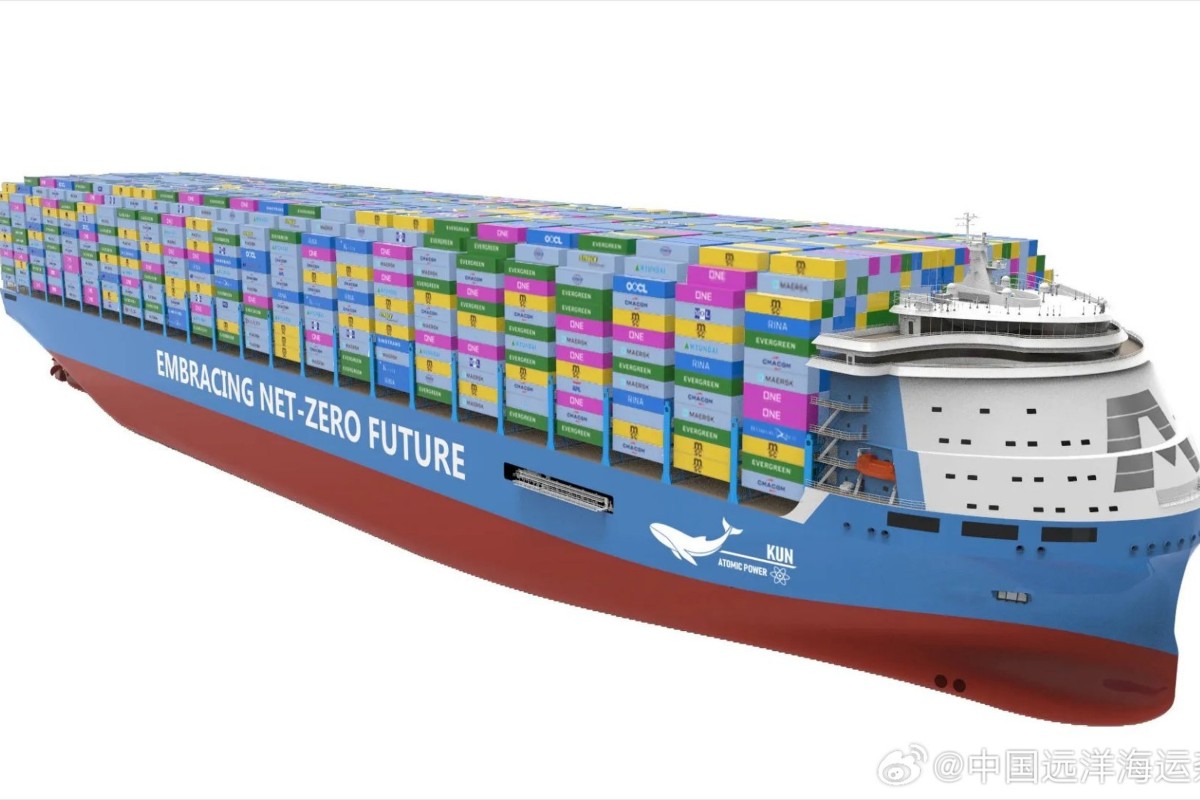- cross-posted to:
- china@lemmygrad.ml
- cross-posted to:
- china@lemmygrad.ml
Here the KUN-24AP container ship would be a massive departure with its molten salt reactor. Despite this seemingly odd choice, there are a number of reasons for this, including the inherent safety of an MSR, the ability to refuel continuously without shutting down the reactor, and a high burn-up rate, which means very little waste to be filtered out of the molten salt fuel. The roots for the ship’s reactor would appear to be found in China’s TMSR-LF program, with the TMSR-LF1 reactor having received its operating permit earlier in 2023. This is a fast neutron breeder, meaning that it can breed U-233 from thorium (Th-232) via neutron capture, allowing it to primarily run on much cheaper thorium rather than uranium fuel.
An additional benefit is the fuel and waste from such reactors is useless for nuclear weapons.
Another article with interviews: https://gcaptain.com/nuclear-powered-24000-teu-containership-china/
Here the KUN-24AP container ship would be a massive departure with its
molten salt reactor. Despite this seemingly odd choice, there are a number of reasons for this, including the inherent safety of an MSR, the ability to refuel continuously without shutting down the reactor, and a high burn-up rate, which means very little waste to be filtered out of the molten salt fuel. The roots for the ship’s reactor would appear to be found in China’s TMSR-LF program, with the TMSR-LF1 reactor having received its operating permit earlier in 2023. This is a fast neutron breeder, meaning that it can breed U-233 from thorium (Th-232) via neutron capture, allowing it to primarily run on much cheaper thorium rather than uranium fuel.Molten Salt Reactors are so cool. It's wild how little they're talked about, given how much of a game changer they seem to be -- basically every mine on the planet is carting out tonnes of thorium. The last time I heard about this, it was still just a theoretical design. But now it's proven and they're putting it on ships? Fuck yeah!
Naturally, there is a lot of concern when it comes to anything involving ‘nuclear power’. Yet many decades of nuclear propulsion have shown the biggest risk to be the resistance against nuclear marine propulsion, with a range of commercial vessels (Mutsu, Otto Hahn, Savannah) finding themselves decommissioned or converted to diesel propulsion not due to accidents, but rather due to harbors refusing access on ground of the propulsion, eventually leaving the Sevmorput [Russian nuclear powered cargo ship] as the sole survivor of this generation outside of vessels operated by the world’s naval forces.
These same naval forces have left a number of sunken nuclear-powered submarines scattered on the ocean floor, incidentally with no ill effects.that seems... convenient. how do they know?
edit; and what's with the coloured words, i was using the
backtick(`) to highlightthat seems... convenient. how do they know?
Because there has been over 50 years of extensive research?
https://www.iaea.org/resources/databases/marine-radioactivity-information-system-maris
We actually take samples and monitor those sunken reactors: https://www.hi.no/en/hi/news/2019/july/researchers-discovered-leak-from-komsomolets.
Water is a fantastic way of insulating radiation. Nuclear plants store used fuel rods in a pool that's only 20-30 feet deep, and you could theoretically swim to within a few feet of the highly radioactive rods without issue.
A melted down nuclear reactor at the bottom of the ocean has zero ecological impact. It's bizarre to consider, but it's been backed up by extensive research.
Yeah but I'm worried about the radioactive metals themselves bioaccumulating in the surrounding wildlife.
that seems... convenient. how do they know?
The primary issue with land-based reactors is cooling to prevent it from reacting uncontrollably. If you're sinking something to the bottom of the ocean there is no cooling problem.
Land reactors pretty much need to be on rivers, and from what i understand severe droughts forceshutdowns in europe a year or two ago.
This year too. Kakhovka dam bombing lowered the river level so much the Zaporozhia power plant would need to be shut down because of that, but it was already shut down by then because danger of AFU attacks. Also the drought in France caused several nuclear power plants to lower the output.
edit; and what's with the coloured words, i was using the backtick (`) to highlight
That's the code highlight markup, which probably has some basic syntax filtering to pick out common keywords. Floor is a common math function, number could conceivably be a value used for a check in some languages, but I'm not sure why "on," "no," "left," or "a" are highlighted and can only guess those are meaningful words in some languages.
Just to see what else it picks up:
That's the code highlight markup, which probably has some basic syntax filtering to pick out common keywords. Floor is a common math function, number could conceivably be a value used for a check in some languages, but I'm not sure why "on," "no," "left," or "a" are highlighted and can only guess those are meaningful words in some languages.left a numberleftanumbera numberleft aonnofloor a numberThis just raises more questions than it answered. Like I can kind of see it doing some kind of heuristic to guess what's a function or variable name, but it's not clear what looks like what to it. I guess that's the issue with using it on normal text instead of just for code, where I'm assuming it highlights things rather more sensibly.
On one hand, we need shipping and we can't keep using dirty fuel. On the other hand, I don't trust any private entities to construct, operate, and maintain nuclear ships. I hope that the Chinese government runs every part of the process and if not, have governmental inspectors 24/7 to make sure that no corners are being cut.
Fukushima happened partially because the private corporation running the plant ignored safety concernsI don't think these kinds of reactors are capable of producing huge safety concerns. MSR tanks are designed to deliberately flood themselves if they ever operate above a certain temperature.
And since it's on a boat, if these safety features ever fail there is one option available that you do not have on land to prevent it from reacting uncontrollably, sink it. I can't see any scenario where you wouldn't be able to cool it down because of the unique access to water that exists. It's only on land where your piping and other things can become irreparably damaged preventing you from getting the necessary cooling into the reactor.
If things get really bad in some way we couldn't possibly predict any explosion on the ship will sink it anyway.
That still all depends on responsible people properly maintaining failsafes and being willing to scuttle the ship if necessary. Corporations cannot be trusted to do any of that.
I don't think you need to rely on people to scuttle, if things get bad enough it will sink itself because it will melt a hole straight through the ship.
Potentially melting down in the middle of a shallow city harbour as an overworked skeleton crew is worried about their families back home getting evicted for not paying the rent all while the parent company does more layoffs and posts record profits in their quarterly reports.
As opposed to the mass extinctions caused by global warming going on right now??
What is your point that you are unwilling to hear safety concerns bc it's worse right now? That's why there is a mass extinction. We have to move away and address safety at the same time. If that means removing private companies from shipping, so be it.
Classic "letting perfect be the enemy of good" energy.
Which is an excellent argument for going back to wind powered ships. Who cares if the treats come a bit more slowly?
I'd love some engineers to do that, I think it'd be totally awesome. However, that hasn't been done and we can only compare proposed solutions to existing ones, not hypothetical ones.
the best clippers were fractions of the size of the boats now, even if modern materials can make a more efficient one, we're talking a difference of 1780 tons --> 336000 tons here. to say nothing of how much more labor is involved on a rigged ship
about every cargo ship has a smaller crew than an old clipper. with central planning and a disregard for profit we could multiply the number of sailors in the world by a few x100 times, but there's no way a capitalist enterprise, or even state-run one that must compete with capitalists will do that.
That fundamentally is the core of the issue though, isn’t it? So long as profit is required we can only do completely batshit things like electric car charging stations in the middle of a 10 hectare surface parking lot and nuclear plants built into every rusty container ship. Stuff that has worked for centuries like trains and sailboats are just too radical and have too many fussy little problems.
so they've mounted some sails on the big cargo ships but all they do is reduce fuel use by 20-30%. if it's even feasible for ships larger than 30% the size of a modern bulk, they gotta be newly built, no retrofitting. rigging does have a bit of automation recently so the question of how much more labor is open, though smaller ships would necessarily mean more labor for the same amount of cargo.
like i endorse it if someone got this going in an mechanized, full-wind power way. it would be dope, but ironically a much larger project than this nuclear boat. which is just changing out the engine that drives the propellor
It's much better to just reduce shipping volume than dive into the unknown without considering safe guards. Your making dangerous arguments that are following the same reckless ideas that got us here.
Which would require a global revolution to accomplish, vs a solution that reduces real harms right now. I thought communists weren't supposed to be utopian?
Utopian is thinking that you just hope it all works out and roll forward ignoring risk again.
The thread is absolutely filled with people telling you there is little to fear. Nuclear isn't profitable, that is why capitalists have brainwashed you into believing it is dangerous. Even with the noted disasters, nuclear has still killed a fraction of the people coal has, per kilowatt hour created. Hell, coal plants are even more radioactive than nuclear ones. And this ship is safer still, because it quite literally can't catastrophically meltdown, as it is in the FUCKING OCEAN.
Such is true, and yet, it would be safer without the commercialization of shipping. What point do you make? None. Only suggesting that we just blindly accept. Not shipping is the best step today until we understand the risks of a new system. Think beyond tomorrow and go slow. We need not rush, only not be complacent. To rush to gain is the disease of the capitalist.
So wait until the oceans are dead already from global warming and acidification and the grand magical global socialist revolution that is coming "any day I swear guys any day" for the last 150 years to do anything about it?
I don't think capitalist globalism is good, I don't think the planet's resources should be being drained so that the treats keep flowing, but there will be megaships carrying goods globally for the foreseeable future, and this could actually, meaningfully reduce our harm done to the precious earth.
The question kind of is what's the other options. The organizational and economic pressure still applies to ICE ships. Not sure I'd be much happier about a normal tanker dumping a few thousand liters of crude oil on the coast.
That was a problem with the reactor designs of the 1950s to 1990s. Over the past half century a lot of smart people have put a lot of thought into idiot proofing nuclear reactors to prevent another three mile, chernobyl, or fukushima. Reactor designers no longer make optimistic assumptions about the operator and assume they are a shortsighted idiot that cannot be trusted to do the right thing.
In modern reactors temperature coefficients tuned to automatically prevent meltdowns is something regulators care a lot about when approving designs. Rather than focusing on building safety mechanisms that the operator can trigger (ie control rods), a natural safety mechanism is built into the formulation of the fuel so if it gets too hot it is no longer capable of nuclear fission.
This is especially the case in small modular reactor (smr) designs meant to be used in commercial applications where no one actually trusts the operator to be responsible. The fuel is formulated to sacrifice some efficiency in exchange for the reactor automatically SCRAMing even if the operator does everything in their power to keep it running.
There is also a push for SMRs to use things like the thorium fuel cycle because it makes the reactor pointless for terrorists or other bad actors to target. The thorium fuel isn't useful for radiological attacks or bomb making, the only reason it even works as a fuel is because it can produce small amounts of uranium that are immediately reacted upon forming. This was the entire reason governments ignored these fuel cycles for decades, they didn't create waste that could be used for weapons making. As a result terrorists are better off getting a shovel and collecting natural uranium off the side of highways in the deserts of North Africa or North America.
https://nuclearsafety.gc.ca/eng/resources/news-room/feature-articles/positive-void-coefficient-of-reactivity-CANDUs.cfm
https://en.wikipedia.org/wiki/Void_coefficient
https://en.wikipedia.org/wiki/Fuel_temperature_coefficient_of_reactivity
Reactor designers no longer make optimistic assumptions about the operator and assume they are a shortsighted idiot that cannot be trusted to do the right thing.
When will this human-centered design philosophy spread to other disciplines?
shortsighted idiot that cannot be trusted to do the right thing
 am I a nuclear power plant operator???
am I a nuclear power plant operator???
molten salt reactors are a different beast altogether, its a very safe design and the fuel used is pretty much everywhere. The fuel is a really big bonus, recall an interview where a nuclear scientist asked a mining outfit how much thorium they threw away in a normal dig and the amount was enough to power America for an entire year if we made use of it. And that's just some random dig



 I'VE BEEN SAYING THIS FOR YEARS LETS FUCKING GOOOOOOOOOOOOOOOOOO
I'VE BEEN SAYING THIS FOR YEARS LETS FUCKING GOOOOOOOOOOOOOOOOOONUCLEAR GOOD VIDEO BY ME
XI DECARBONIZE THE SEAS
Typical of bazinga brains to mald in the comments about any Chinese advancement.
Yeah. Annoying because nuclear powered container ships are the only realistic way to decarbonize transoceanic shipping. When you do the math, the biofuel and e-fuel plans western shipping firms have all presented are obviously not feasible. There isn't enough farmland on earth to produce enough feedstock for the required amount of biofuel and with e-fuels the economics don't work out due to how much electricity is needed per liter of fuel synthesized.
Got some of them in this thread too, the typical ignorant NUCULURR BAD folks who know literally nothing about power generation at all
just scroll down. Hackaday in particular has been the way it is for a really long time.
safer then potentially dumping a zillion gallons of the dirtiest bunker fuel into the ocean when something goes wrong
I'd say this is a real shot across the bow for Australia, as it signals decoupling from the coal economy.
Incidentally, Australia has huge reserves of uranium, so a nuclear economy would rely on them as well. Unless you're using breeder reactors and/or thorium reactors.

This is a fast neutron breeder, meaning that it can breed U-233 from thorium (Th-232) via neutron capture, allowing it to primarily run on much cheaper thorium rather than uranium fuel.
Australia isn't looking so happy.
[China] aims to build an industrial prototype fusion reactor by 2035 and have the technology in large-scale commercial use by 2050.

They've been saying fusion is right around the corner since the 50s. What's the chance they're right this time?
They're much more right than they were in the 1950s.
There are multiple reactors right now, utilizing different design approaches, which can fuse and contain plasma. The work right now is on increasing the net-energy and reaction time
China has a lot of mining operations and therefore a ton of thorium just laying about.
Learn this one neat trick to decouple yourself from the hated English post-colonial dregs.
Australians hate it.
But modern container ships don't burn coal, they burn bunker fuel which is an oil product?
Australia's days are numbered either way with China moving towards renewables an nuclear at speed but I just don't see the connection here.
Noo! Maybe if we just insult them a couple more times, insinuate they are inhuman oriental savages who should be grateful that our blessed white nation is willing to give them our wonderful coal, they'll change their minds.
IIRC the 10 largest ships in the world pump more carbon in the atmosphere than all the cars in the world, so this is pretty great!
Not carbon, but particulate pollutants or something. Ships use way less refined fuel than cars do.
Good article finds. It would be really funny if Samsung enters the nuclear ship industry lol.
Considering the other options are wind power and synthetic fuels, lots of nuclear ships will probably be preferred.
I'd rather they use these massive ships for making hydrogen oxygen splitting than promoting corrosive radioactive salt nukes. And no I wont be responding to the nuclear zealots and lobyists here.
 I hope the best for China, and I hate having to pay a "China tax" save being accused of "racism" or "nationalist chauvinism", but nukes IMO are not the way forward. Too much risk.
I hope the best for China, and I hate having to pay a "China tax" save being accused of "racism" or "nationalist chauvinism", but nukes IMO are not the way forward. Too much risk.Where is the energy to generate hydrogen going to come from? If it were pure renewables you'd have to cover all of Xinjiang in solar panels. Also what specific issues do you have against Thorium reactors? I was led to believe that they were a much better alternative in terms of safety and waste. /gen.
Yeah, it's not great, and it doesn't address hyper consumption. But if the treats must flow, molten salt reactors are a much better on multiple fronts - less fuel consumption when the shipping industry is a major contributor to CO2, and it's a much safer reactor that produces way less waste compared to other types. Still dangerous, but so is a boat full of petrol based fuel if there's an accident.
An additional benefit is the fuel and waste from such reactors is useless for nuclear weapons.
And here we have the reason the US has not been using throium reactors despite their safety, easy to procure fuel, and much safer waste materials.



























